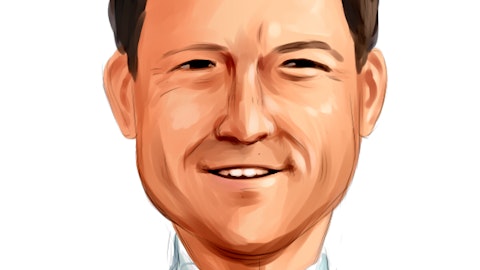Brooks Mallard: Hey, Julian, that’s a good question. It gives me an opportunity to level set. Remember, last year was when we started to see the supply chain disruptions, and you really saw Q4, we were better than Q3 as we – as some of those disruptions started to go away, and we did better in Q4 and had a really strong Q4 in terms of top-line last year. And so really, you got to think about the back half of this year and you’re comping, you want to comp to the whole back half of 2022, because there was just some movement in between quarters that was more externally driven by some of the supply chain disruptions. So when you look at the back half of the year, you’re right on the low single digits of Q4, a little bit more headwind in Q4 from a core growth perspective than Q3.
But net-net, we’re guiding to around the 200 bps impact overall in the back half of the year. And that’s split pretty evenly between industrial and personal mobility. And most of the industrial piece of that headwind is coming from, as Ivo said earlier, a little bit lower expectations on how quickly the recovery is going to happen in China. The recovery is still there. It’s just a question of how quick and the magnitude of the recovery through the back half of the year. And then I’ll let Ivo answer the question on the longevity of the downtime.
Ivo Jurek: Look, every downturn is slightly different. I would say that we continue to fortify our performance. I think, based upon the initiatives that we have executed, you should see more stability in automotive replacement side of our business. That business is performing well. There are some very positive trends as we have discussed on other calls associated with the aging car fleet, growing car park of the aged car fleet, people are driving more. Fuel is reasonably affordable. So we certainly believe that as we move through whatever the slowdown maybe, we should have a little more robust performance than perhaps we have seen in the past. When you combine it with some of our organic growth initiatives, I wish that I had a real good crystal ball for you.
But when you look at the trend lines from some of the indices that we all track and you do such a fine job Julian on publishing those indices should start reversing trend. And when they do reverse trend that also generally speaking, means that we should start seeing some bottom to the industrial activity. So, I know I didn’t give you a clear cut crystal answer, but we feel maybe a little cautiously more optimistic about our ability to manage through whatever is in the future out there. Protect profitability, continue to drive our free cash flow. I think that our focus on both is starting to show early benefits. And that’s kind of where we sit.
Julian Mitchell: That’s helpful. Thank you. And then maybe just following up on a couple of smaller items. Just any sort of revised outlook for second half interest expense and the tax rate? And then I think you said the CapEx budgets come down a bit for 2023. Any sort of firmer steer on the CapEx budget this year?
Brooks Mallard: On the tax rate, we should be right around 20% to 22% so we’re trending down a little bit. We were lower in Q2, but for the full year, pretty in line with what we had said earlier. From an interest expense perspective, our total interest is going to be up year-over-year in the high teens. And that’s kind of split evenly between – when you talk about net – I’m talking about net interest expense. And that’s split pretty evenly between – remember, we refinanced our euro term loan in the fourth quarter of last year. And so there’s the impact of those higher interest rates and then there’s the impact of the higher interest rates on our U.S. dollar-based Term Loan B, and that’s the other half of the impact.
So it’s – the impact in the second half, I think, is about half what it was in the first half, because you kind of rolled over some of those interest rates in Q4. Was there a third question? Did I get – I got tax and I got interest. Was there a third one?
Julian Mitchell: And the third question is with the CapEx.
Ivo Jurek: Yes, I can maybe answer that question. Julian, we don’t fundamentally believe that we’re going to be dramatically reducing our CapEx. It’s more aligned with our ability to secure some of the new equipment. Some of the lead times are still somewhat extended, and we just don’t believe that we’re going to spend the full $100 million. But we’re going to be good in striking distance on that number. So it’s not an issue of reducing CapEx dramatically.
Operator: Your next question comes from the line of Josh Pokrzywinski of Morgan Stanley. Please go ahead.
Josh Pokrzywinski: Hi good morning guys.
Brooks Mallard: Good morning.



